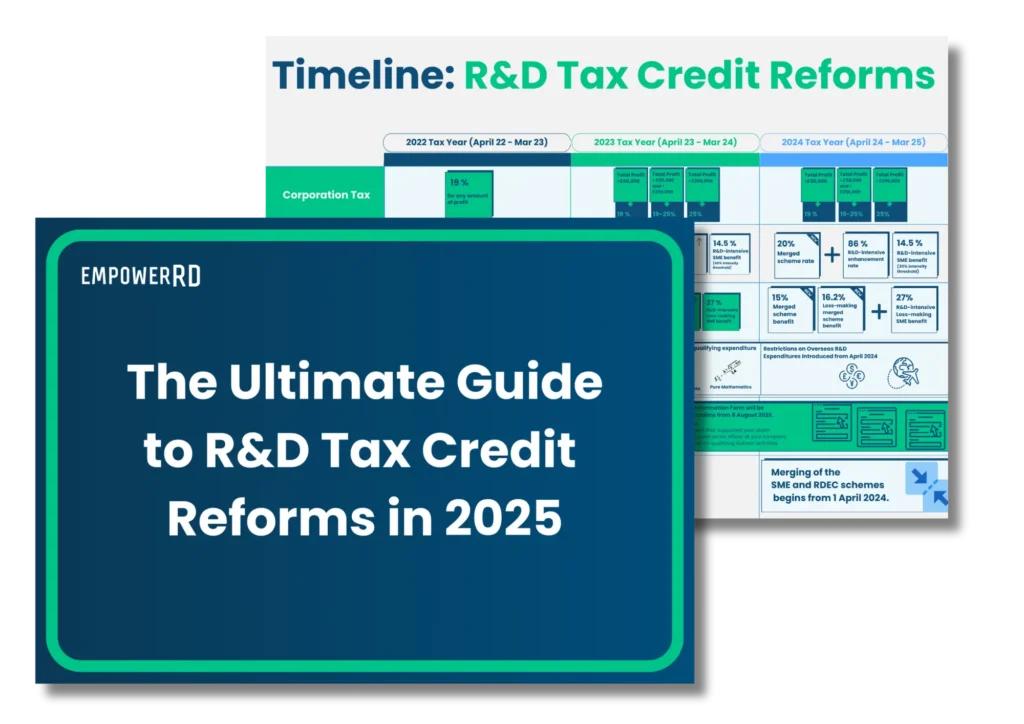Yesterday, HMRC released the Annual Report and Accounts for 2022-23, which unveiled concerning trends of suspected “fraud and error” related to R&D Tax Credit schemes.
At EmpowerRD, we have examined the report to offer crucial insights into HMRC’s proactive efforts in tackling non-compliance in the R&D tax relief landscape. This article aims to clarify the increasing demand for R&D tax reliefs, address concerns regarding errors and fraud, and highlight HMRC’s measures to improve compliance.
The rising demand for R&D Tax Reliefs
The popularity of R&D tax reliefs has been on a steady ascent, with a record-breaking 89,300 claims amounting to £6.6 billion filed in the 2020-2021 period. Looking ahead, HMRC projects a substantial surge in claims, estimating the cost for 2027-2028 to reach an impressive £9.5 billion.
The increasing demand underscores the significance of maintaining a robust and compliant framework for R&D tax relief schemes, ensuring that businesses are adequately supported in their innovative pursuits.
Unveiling error and fraud concerns
Despite the undeniable success of R&D tax reliefs, the government’s review in 2021 brought forth concerns about potential abuse and non-compliance within the schemes. To address these issues proactively, HMRC initiated a comprehensive analysis to understand the extent of non-compliance in the R&D tax reliefs. This involved the most detailed work ever undertaken for these schemes. The new methodology for estimating non-compliance relied on a mandatory random enquiry program (MREP) focused on SME claims. The new figures have been released in the Annual Report and Accounts for 2022-23.
Understanding the updated figures
According to the latest report from HMRC, the analysis has uncovered alarming figures for the year 2020-2021. The level of error and fraud in the scheme stands at a staggering 16.7%, equivalent to a substantial £1.13 billion. This is significantly higher than the previous estimate of 3.6% (£336 million) for 2020-21.
Digging deeper into the numbers
The breakdown of the data exposed alarming levels of non-compliance within the SME scheme for 2020-2021, reaching 24.4%. This amounted to an estimated £1.04 billion in erroneous claims.
Similarly, the RDEC scheme, catering to large companies and ineligible SMEs, encountered non-compliance at 3.6%, equating to £90 million. Such figures further justify the government’s decision to implement a series of measures to address and reduce error and fraud in the R&D tax relief scheme.
Note: MREP estimates are subject to a two-year delay due to filing deadlines for Corporation Tax returns and compliance enquiries. Therefore, the most recent estimate does not reflect recent government reforms implemented over the past three years.
HMRC’s action for enhanced compliance
HMRC implemented a series of operational and policy changes over the past few years to combat non-compliance and fortify the system’s integrity.
Operational changes
To bolster efforts against non-compliance, HMRC doubled the staff dedicated to R&D compliance, ensuring a more rigorous assessment of claims. This includes an additional 300 individuals dedicated to tackling non-compliance. Moreover, HMRC established an R&D Anti-Abuse Unit to detect and prevent fraudulent activities proactively.
Policy adjustments
HMRC mandated digital claims to enhance compliance, streamlining the process and promoting greater accuracy. Furthermore, claimants must now provide additional information to substantiate their R&D claims fully. Additionally, HMRC adjusted the amount of payable relief for SMEs to encourage accuracy and discourage erroneous claims.
HMRC’s compliance approach
At the core of HMRC’s compliance approach for R&D tax reliefs lies the principle of assisting businesses in getting their R&D claims right from the start. This “upstream” compliance focuses on prevention and reducing error-related non-compliance. HMRC endeavours to support businesses most at risk of making incorrect claims through educational campaigns, improved guidance, and educational webinars.
Operational interventions
HMRC’s approach to addressing non-compliance involves targeted interventions to mitigate risks. This includes prevention during the claim process and customer education wherever possible. In cases where complex non-compliance is identified, specialist staff undertake detailed examinations of claims. Additionally, the newly established R&D Anti-Abuse Unit addresses cases where deliberate abuse of the relief is suspected.
Working with agents
Recognising the importance of working with agents in the R&D tax relief regime, where over 90% of claimants are represented by agents, HMRC collaborates with reputable agents and professional bodies to enhance the quality of R&D advice. HMRC takes a tailored approach to address agent misconduct firmly in line with its overall approach.
Improving HMRC’s insight and risking
HMRC adopts a risk-based approach to effectively respond to non-compliance, customising its strategy based on risk levels and customer behaviour. The increased data on individual claims from August 2023 will enhance HMRC’s ability to analyse risks and improve the risk process. Customer feedback is vital in shaping HMRC’s compliance strategies, providing valuable qualitative insight.
EmpowerRD’s response
The growing demand for R&D tax reliefs has brought concerns over potential abuse and non-compliance to the forefront. HMRC’s comprehensive analysis has revealed alarming figures, prompting decisive action to strengthen compliance measures. Operational and policy changes and a tailored approach to working with agents signify HMRC’s commitment to safeguarding the integrity of the R&D tax relief schemes. At EmpowerRD, we support these reforms, particularly the emphasis on mandating digital claims and working with agents to enhance the quality of R&D advice. Promoting compliance and supporting businesses in their innovative endeavours, will help to maintain the UK’s position as a competitive location for cutting-edge research.












